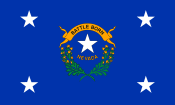Flag of Nevada
 | |
| Use | Civil and state flag |
|---|---|
| Proportion | 2:3 |
| Adopted | July 25, 1991 |
| Design | A solid cobalt blue field. The canton constitutes two sagebrush branches encircling a silver star with the text "Nevada" and "Battle Born". |
| Flag of the governor of Nevada | |
 | |
| Design | Canton of the state flag in the center, with four white stars, one in each corner |
The flag of the U.S. state of Nevada consists of a cobalt blue field with a variant of the state's emblem in the upper left-hand corner. The emblem constitutes a silver star (a reference to the state's nickname, the Silver State), with the state's name below. Above the star is a golden-yellow scroll with the words "Battle Born", one of the state's mottos (in reference to Nevada becoming a state during the American Civil War). Below the star and state name are two sprays of green sagebrush (the state flower) with yellow flowers.[1]

History
[edit]The first flag of Nevada was created by Governor John Sparks and Colonel Harry Day in 1905. It was based strongly on Nevada's natural resources of gold and silver. The blue of the flag was to be the same as the blue on the flag of the United States.[2]
The second flag of Nevada was designed by Miss Clara Crisler in 1915. The flag sought to be more representative of Nevada by adding the state seal as the center point of the flag. The flag retained the same blue field as the previous flag. The 36 stars on the flag represented how Nevada was the 36th state in the union. The flag proved popular, but the abundance of colors on the seal was too expensive to produce which led to the adoption of a new flag in 1929.[2]
The current flag had its origin in a design contest announced in 1926. The winning design, by Louis Shellback III, was subjected to some revision in the state legislature, where there was disagreement between the two houses over the placement of the word "Nevada" on the flag. A compromise was reached, and in 1929 Governor Fred B. Balzar signed into law a bill adopting the new flag. In 1989, however, a legislative researcher discovered that the bill as sent to and signed by the governor did not accurately reflect the 1929 legislative agreement. The flag used from 1929 until it was revised in 1991 displayed the letters of the word "Nevada" in a complete circle around the flag's single star, with the "N" of Nevada at the uppermost tip of the star indicating its "northern" position in the civil war, and with each of the other letters of the word Nevada located in the spaces between the remaining points of the star, displaying near each junction of the star's pentagonal center. Thus, "Nevada" was spelt from the "N" at the top, radiating clockwise E, V, A, D, A, in the spaces between the star's points. A law enacted in 1991 directed that the word "Nevada" appear below the star and above the sagebrush sprays, thus producing the current design.[2]
Gallery
[edit]-
 John Karp's proposed flag for Nevada from 2001, which won flag redesign contests in both the Utne Reader and the Nevada Magazine.[3]
John Karp's proposed flag for Nevada from 2001, which won flag redesign contests in both the Utne Reader and the Nevada Magazine.[3]
See also
[edit]References
[edit]- ^ "State flag". Nevada Revised Statutes; Chapter 235§20. State of Nevada. 1991. Retrieved March 14, 2010.
- ^ a b c "Nevada Trivia". The Nevada State Trivia game. Retrieved July 9, 2024.
- ^ Karp Jr., John C. (July–September 2001). "Proposed Redesign Of The Nevada State Flag". NAVA News (171).





![John Karp's proposed flag for Nevada from 2001, which won flag redesign contests in both the Utne Reader and the Nevada Magazine.[3]](http://upload.wikimedia.org/wikipedia/commons/thumb/2/2d/Proposed_Flag_of_Nevada_%282001%29.svg/120px-Proposed_Flag_of_Nevada_%282001%29.svg.png)